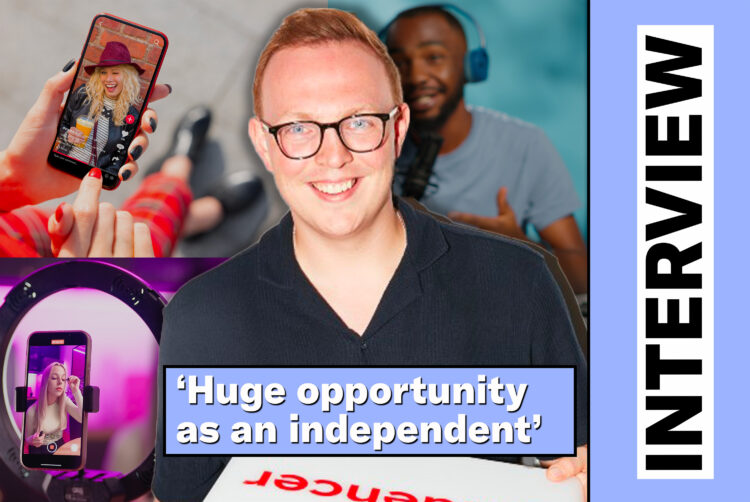Why Influencer is an agency that doesn’t want to be bought

The Media Leader Interview
Influencer CEO Ben Jeffries and chairman Stewart Easterbrook discuss the growth prospects for the independent influencer marketing agency and why influencers are getting looks for both creative and media budgets.
Ben Jeffries, the co-founder and CEO of influencer marketing agency Influencer, values their independence.
“Obviously there has been a lot of M&A activity in the space,” he tells the The Media Leader over video call. “You’ve seen WPP acquire three agencies, Goat, Village and Obviously. You’ve seen Publicis acquire Influential. You’ve seen Stagwell acquire Movers+Shakers. I think what’s really interesting about this is for us is we really see this as a huge opportunity as an independent.”
Indeed, Jeffries declares Influencer is not looking to be “absorbed” into the world of holding companies.
Rather, he reveals there “is an opportunity” for Influencer to consider making acquisitions itself “both from a bolt-on perspective and a geo-expansion opportunity, where there are people who maybe have good strongholds in markets that we’re not in.”
“We’re just getting started,” he continues. “We believe we’ve really got the foundations laid for us to really challenge a lot of the media agencies for these dedicated influencer budgets.”
The goal in the next year is to work for a continually growing number of Fortune 500 clients. Says Jeffries: “That’s where international expansion really helps.”
Geographic expansion
Influencer has been seeking to grow its footprint in new markets, particularly the US and Canada but also in Germany and the Middle East and Norht Africa.
In pursuit of that goal, industry veteran Stewart Easterbrook joined the company as chairman in June, a development Jeffries called “gamechanging” for his newfound capacity to solicit “readily available advice”.
Then, last week, the agency also announced the appointment of Rabah Assaf as managing director for MENA operations.
“We’ve got our first few boots on the ground,” says Jeffries. “Now we must scale these up and then assess where else across EMEA we also want to expand.”
Easterbrook also serves as chairman and strategic advisor of outdoor company Talon, independent media agency Medialab Group, and strategic advisor for programmatic company MiQ. He formerly worked as CEO of Publicis agency Starcom MediaVest Group (now Starcom Worldwide).
“We’re in a very high-growth phase at the moment,” Easterbrook tells The Media Leader.
“It’s clearly become a really important space. It’s where audiences spend a huge amount of their time and engage with a lot of messages. And therefore it provides a really good opportunity, I think, for brands and people who want to communicate messages to really engage audiences properly in an environment that they naturally want to be in anyway. That type of formula has always been the winning formula.”
Ceding control to creators
 As influencer marketing has become more popular, Easterbrook (pictured, left) says brands have had to become more comfortable with outsourcing their brand messaging in order to get the most out of the medium.
As influencer marketing has become more popular, Easterbrook (pictured, left) says brands have had to become more comfortable with outsourcing their brand messaging in order to get the most out of the medium.
The standard advice for working with content creators is to give them leeway to speak to their audiences about products in a way that is authentic to them and their following, rather than parroting corporate branding.
“It’s different from the world I was inhabiting 10-plus years ago with Publicis,” he says. “Brands being more conservative was very much still the prevailing thing. […] I’m a little bit surprised, actually, the extent to which brands have converted into this newer world and been prepared to give up an element of control to use influencer marketing effectively.”
Jeffries noted that within the past year, influencer marketing has taken a greater share of the media plan, with social media spending overtaking search to become the world’s largest channel earlier this year, according to WARC.
But according to Jeffries, creators are now also being considered “a serious creative buy”.
“You’re starting to see influencer marketing not just have its own line item on the media plan, but actually it appearing under every line item as the creative that fuels it,” he says.
When asked whether that means creators are replacing creative directors at ad agencies, he replies that creators are working “more in partnership” with creative directors to craft messaging for niche audiences, rather than necessarily replacing them altogether.
He adds that brands are “seeing that creator content is outperforming brand-produced content on paid social”, leading them to transfer paid budgets that previously would be used to amplify messages elsewhere to sit instead behind the creator content itself.
The relatively rapid advancement in importance of the creator economy for brands has come with its own concerns — chief among them maintaining commitments to ad standards. The EU in particular has considered instituting regulations on the influencer market. Influencer Marketing Trade Body (IMTB) director-general Scott Guthrie has previously cited concerns around influencers sometimes failing to disclose whether posts are advertisements as a key point of tension.
Jeffries, who sits on the board of the IMTB, says it is “imperative” the industry set and enforce standards for ad disclosure and meets with the Advertising Standards Authority (ASA) “on a regular basis” to collaborate on self-regulatory procedures.
Europe’s new influencer marketing alliance aims to address ad disclosure concerns
Multi-platform approach
Given there are a number of social-media platforms within which influencers maintain audiences, Jeffries explains Influencer takes an outcome-based approach when working with brands to apportion spend across the likes of TikTok, Meta, Snap and others.
“In every case it will be a multi-platform approach because consumers are on every platform,” he says.
Each platform currently has a slightly distinct use case. Jeffries singled out TikTok as having done “an incredible job at supporting the creator community” and making it possible “for anyone to become an influencer” on the platform so long as you “create good content consistently.”
YouTube, through its short-form video competitor Shorts, is, however, a big source of opportunity for influencers, according to Jeffries.
“They’ve taken a bit of a backseat because they haven’t necessarily focused as much on creators as they would have liked, but now with YouTube Shorts they’re encouraging creators and working with [them] to help them build audiences,” explains Jeffries. “I think there’s an opportunity for brands to tap into that because there are some insane views that are occurring on that platform.”
He adds that Instagram is often core to influencer marketing plans because of its “varied content formats” between stories, Reels and standard posts. Snap, meanwhile, is positioning itself as “a place where creators can be themselves” and post content that is not as highly produced.
On the other hand, there are other social media platforms that Influencer keeps as “potential partner[s] that advertisers can use” but that do not get as much attention from its clients.
In particular, Jeffries reveals that X is not of interest to advertisers. “We haven’t see it be one which advertisers have wanted to focus their budgets on,” says Jeffries delicately.
‘Weaponised’ litigation: Industry stands ground against X following GARM shutdown
Many social media companies have in recent months leant increasingly into AI not just to create tools for advertisers, but also content creators themselves. This summer Meta launched its AI Studio feature in the US, which will allow anyone to create an AI character and for influencers to create “an AI extension of themselves” with the goal of indirectly interacting with fans.
But while Jeffries believes social media companies’ AI efforts will support creators in their editing or asset development, leading to more content production, he is not as bullish on the use of AI influencers.
He says: “AI will change the way that influencer marketing is going to occur, but I don’t think it will necessarily be as prevalent between the relationship between the creator and their audience.
“What audiences value is that human connection with the creator.”




